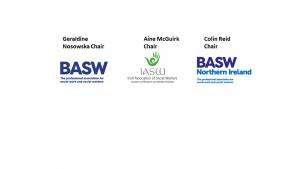Irish Association of Social Workers (IASW) and BASW issue joint statement about implications of Brexit
Irish Association of Social Workers (IASW) and BASW issue joint statement about implications of Brexit at IFSW European delegates meeting and ask for IFSW Europe executive and all social work associations to write to British government to recognise and mitigate risks of Brexit to the profession and social work services.
IFSW Europe have endorsed this statement.

IFSW European Delegates Meeting
6 September 2019, Vienna
STATEMENTS ON BREXIT
British Association and Irish Association of Social Workers
Introduction
In a United Kingdom (UK) referendum on 23 June 2016, 52 percent of those voting supported leaving the European Union (EU). The UK Government started a process which was due to conclude with the UK's exit on 29 March 2019. That deadline has since been extended to 31 October 2019. The withdrawal of the UK from the EU is called Brexit (British Exit).
As this paper was written, there was not clarity about arrangements for Brexit. The current UK government is planning to leave the EU. However there are also significant political forces campaigning to remain.
1. From the Irish Association of Social Workers and British Association of Social Workers Northern Ireland
In December 2018 The Irish Association of Social Workers and the British Association Of Social Workers Northern Ireland wrote to key politicians across the island of Ireland expressing concern about the potential impacts on our profession – and, particularly, on the individuals, families and communities our members support - resulting from the UK’s decision to leave the European Union, widely known as Brexit.
The biggest issue for social workers and service providers in Ireland is the maintenance of a frictionless border between the two jurisdictions. It is fundamental to the daily lives of many of our service users and their carers, and fundamental to the delivery of services that can cross communities and in this case borders. Key to this is free movement as we have enjoyed since the signing of the Good Friday Agreement in 1998. When the UK leaves the EU this freedom is threatened.
Key aspects are:
- The mutual recognition of Social Work qualifications by both countries under new arrangements.
- The treatment of non-Irish EU national social workers living in the Republic of Ireland and working in Northern Ireland pending the declared UK immigration caps on skilled workers.
- The implications for the users of care services. The hospital, residential and community care sector in the UK relies heavily on EU citizens to fill a significant percentage of care posts. After the UK leaves the EU, they will no longer have the benefit of the free movement of workers across Europe.
- There are complex unknowns for children in residential or kinship care placed on different sides of a border, or who are from other European countries. As social workers we know that these are the least considered people in the scheme of economic, trade and financial concerns that dominate the agenda for such radical change.
- There are funding uncertainties for projects that work to promote and strengthen the peaceful progress of relationships across the Irish border and facilitate recovery for generations that have been affected by the political difficulties of the territory.
- There is a need for every effort to be taken to maintain the fragile peace in Northern Ireland.
We look for the support of our European colleagues and acknowledgement at European level of the impact of the UK’s exit from the EU for social work on the island of Ireland including the Republic of Ireland, Northern Ireland (that is part of the UK), and the people we work with.
We request IFSW to write to the UK Prime Minister and to the Taoiseach (Prime Minister) of the Republic of Ireland, and for IFSW member organisations to write to local MEPs, to outline these concerns on behalf of the profession to state that:
- All efforts must be directed at maintaining peace in Northern Ireland
- There can be no return to a hard border of any kind in Northern Ireland
- The portability of Social Work Qualifications across the island of Ireland must be guaranteed
- Social workers working across the border must be enabled to travel freely to support children, adults and families
- The best interests of children currently placed on different sides of the border and of families divided by the border must be promoted
- EU citizens working in social work, health and social care in the UK must be respected, their contribution valued and their security ensured.
IASW and BASW NI will continue to work collaboratively for the good of social work and the people we serve across the island of Ireland.
2. From the British Association of Social Workers UK
In addition to the specific concerns relating to the island of Ireland, BASW UK wishes to highlight the wider impact of Brexit on social work across the UK.
There is a significant number of EU nationals currently employed as social workers in all parts of the UK, and also in the wider health and social care workforce.
Portability of social work qualifications between nations should be maintained, meaning that UK qualified and registered social workers can continue to practice in nations of the European Union and vice versa.
Human rights are at the core of the social work profession. EU Human Rights legislation currently plays a vital role in shaping the rights-based approach to social work in the UK. Service users and social workers with disabilities or from ethnic minority backgrounds, for example, must be able to live and work with confidence that they are protected by UK law, at least to the same degree that they currently benefit from as EU citizens.
Social work is an international profession. Many of the structures and processes of the EU facilitated the process of the exchange of knowledge and good practice.
We additionally ask, therefore, for IFSW to write to the UK Prime Minister and for IFSW member organisations to write to local MEPs to state that:
- EU Nationals in social work should have leave to remain and work in the UK
- Planning for the social care and health workforce must include recognition of the need for EU citizens as part of that workforce
- The portability of Social Work Qualifications must be guaranteed, both for UK qualified social workers seeking to work in the EU and vice versa
- The rights conferred on UK workers by EU legislation must be brought into UK law
- The UK’s exit from the EU must not result in an erosion of human rights currently secured by EU legislation
- Opportunities for research, learning and development across Europe must be protected.
BASW remains committed to international engagement, and to social work relationships across Europe and the world. We will continue to work as part of the global profession to further social work’s purpose and uphold its ethics.
As a signal of this commitment, we look forward to welcoming colleagues to the IFSW Europe Delegates Meeting and international conference in Birmingham in April 2020.
British Association of Social Workers and Irish Association of Social Workers (August 2019)
